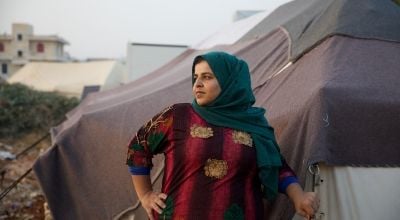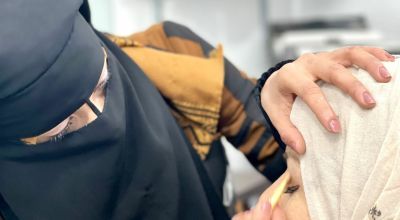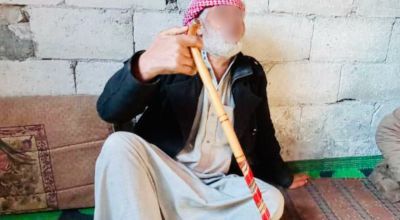
Read our 2023 annual report

Knowledge Hub
The youngest Syrian refugees find comfort in tent classrooms
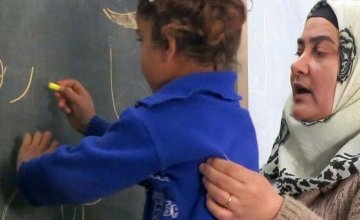
For many months, all of Tala Sahad’s thoughts were of war. As an 11-year-old refugee living with her mother and younger brother in northern Lebanon, her days were a patchwork of competing emptiness, loss, sorrow and fears about her father, imprisoned in Syria.
Then Concern Worldwide began an informal education programme, gathering children in tents, offering them instruction along with a chance to read, write, draw and, even more, to laugh. Now Tala wakes up early, lives for her schoolwork and dreams of becoming a doctor. Her mother, 32-year-old Assria, is more circumspect, knowing a refugee child will face many barriers on the way to a professional career, but still grateful for the programme.
“I can’t help but worry that she will be disappointed,” says Assria as she offered guests bread with oil and za’atar. “At the same time, I’m so glad she has dreams. All we know about my husband is rumours, and my children miss him."
It used to be that they were sad all day long. Now, on school days, they rise before their mother. They finally have something to look forward to.
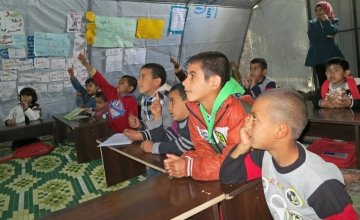
In the fighting that began in March 2011, pitting a wide variety of Syrian, regional and international actors against one another in a devastating civil war, more than 220,000 Syrians have been killed, and almost half the population displaced, many across international boundaries.
Nearly two million Syrian children are refugees, the United Nations Refugee Agency reports, and they should have their right to access to education guaranteed by the Convention on the Rights of the Child. But humanitarian aid for education forms only 2 percent of humanitarian aid budgets. In all, UNICEF says about 2.8 million Syrian children are out of school.
In Lebanon, the government has opened public schools to Syrian children, but language barriers, overcrowding and the cost of transportation keep many refugee children out of school. Concern began responding in Lebanon in 2013. Now, we support the education of over 1,850 registered students, including some Lebanese students, in 25 learning spaces, and the work of Lebanese and Syrian “facilitators” to help teach the children. Additionally, Concern was selected by UNICEF to run a homework support programme that includes 2,550 students, both Lebanese and Syrian, in 12 learning spaces, including three public schools.
It is not only the children but also the facilitators who are gaining from the informal education programme. Aya al-Mahameed, 25, always dreamt of being a teacher. But when she married at age 19 and had her first child within that year, her dreams seemed unlikely. She was the mother of an infant and a toddler when the Syrian war became personal, engulfing her neighborhood.
First her father was imprisoned. Then, “two bombs hit the house next door, killing all the children inside,” she said. Death at her doorstep was the last straw. “We got on a bus with others who were fleeing. The driver drove fast, like a crazy man, but it still took us all day to travel 60 kilometers,” she said. That was two years ago.
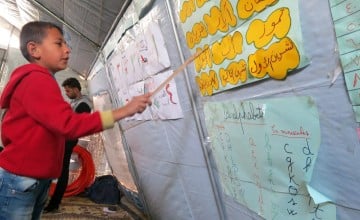
Through the Concern informal education programme, Aya received teachers’ training. Now she leads classes in art and Arabic. The tent that is Aya’s makeshift classroom shakes noisily in the wind and is cold in the winter and hot in the summer. The children lean over makeshift desks that are sometimes wobbly. But Aya dismisses all of that.
Outside of school, these kids are still struggling, still talking a lot about the war, and about wanting to return home and fight. But during class time, all they think about is their education. This makes their parents happy as well. Yesterday, I got a note from the mother of one of my students, Ali, thanking me for what I am doing.
Not only is she helping her community and boosting her own self-esteem, but she has become her family’s main breadwinner, thanks to a modest compensation. “I didn’t have any voice in my family before,” she said. “Now I do.”
One of the students in her class is 12-year-old Fatima, whose favorite subject is Arabic. She fled Syria with her family two years ago. “There were bombs, and checkpoints all around my home, and that scared me, but I still didn’t want to leave Syria,” she says.
I miss my home. I miss my friends. Studying is the only thing that helps me forget.
Ahmad, a Syrian refugee father of four who asked that his last name not be published for security reasons, has four children, and two of them are old enough to attend the classes. He said he is more grateful for the classes than for any other single piece of support his family has received. “This war turned our world upside down. For a time, I wanted to stop living,” he said.
I want to return to Syria but I don’t know that I ever will. If I am going to die here, then I will live for my children, and it is most important that they get educated.
Keep in touch
Keep up to date with all of our work by following us on Instagram.



